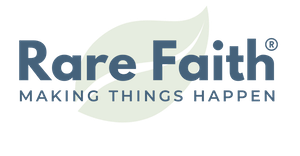
Interview with Randy Gilbert, Inside Success Show
Introduction and Questions for Leslie Householder | TRANSCRIPT
The topic for today is “The Jackrabbit Factor: Why You Can,” an incredible tale of a couple who reached the breaking point when their fear of not being able to earn a living despite hard work destroyed their family and opened up the opportunity to rebuild it.
Our next special guest uses an allegorical tale that echoes with the financial fear common for too many households in America in order to teach the success principles of the ‘top 3%’ in a way that connects. This is a fun way to learn how to think like the successful.
If you want to learn how to live without desperation, take the risk out of risk and put financial fear in its place, then I highly recommend you give your attention to this expert on financial success principles.
I’m introducing Leslie Householder, author of “THE JACKRABBIT FACTOR: WHY YOU CAN.”
Leslie Householder is a wife and mother of six young children. She is the founder of ThoughtsAlive.com and the author of “Hidden Treasures: Heaven’s Astonishing Help with Your Money Matters” as well as the E-Course, “Heavenly Help with Money Matters.” Her articles have circulated in numerous internet and print magazines.
Leslie has developed her talents as a seminar speaker and personal success coach since 2002 and is now a sought after guest speaker. She has authored many workshops including, “Working with your Subconscious Mind to Achieve your Goals,” “Leaning on the Lord in a Financial Crisis,” and “Tuning in to the Abundance God has for You.” She has held numerous teleclasses, servicing participants across the world, and also conducted seminars as a facilitator for Bob Proctor’s Life Success programs in several states in the continental U.S.
Her young family has been her motivation to compose a message, which will continue to reach her audience even while she watches Oobi with her preschoolers and changes diapers at home (approximately 36,135 diapers so far at this date and still counting).
You can learn more about Leslie and her message at ThoughtsAlive.com.
Leslie Householder, welcome. It’s great having you on the show and I’m really looking forward to the details of this fascinating topic, however, before we get into some of your strategies, please share with us some of your inside story.
Leslie, what do you consider to be your humble beginnings? Your website mentioned measuring purchases against ramen noodles.
You know, I was so hung up on paying bills that groceries always took last priority. And that was extremely frustrating because quite often we didn’t even have what we needed for bills. I discovered that Ramen was about the cheapest way to fill the hole at 10 cents per person per meal – on sale. Humble beginnings? Well, I remember being out of groceries and getting angry with my kids for complaining about whatever it was I made. I finally told them, “look, if you want something better, you’re going to have to take it up with God.” I was irritable and went into a depression that affected me for much of the first 7 years of our marriage. At one point when we lived in an old 2 bedroom apartment, the neighbor kid broke my broom in half and because I didn’t have $7 for a new broom I called the cops on him. That’s where my mentality was.
As a young couple, you and your husband invested a lot in success seminars. What motivated that choice?
It all started the first year we were married. We had decided before tying the knot that when the children came, we both wanted me home to raise them. After only 5 months, we had our first on the way, and that began the search for a way to get me home from work. Someone approached him at the grocery store and after chatting for a while, my husband mentioned he was looking for an opportunity, and the guy introduced us to some pretty wealthy people who taught us how badly we needed to change the way we thought. We started attending seminars, and realized how important it was for us to associate with people who had the lifestyle we wanted. We just didn’t know it would take us 7 years to fix us.
Why did you choose to use an allegory to teach the messages in your book “Jackrabbit Factor?”
Well, after 7 years and being deep in debt from chasing seminars all over the country, I had had it. It had become a habit to go, (I call us seminar junkies), and so the thought of giving up felt like mourning the loss of a loved one, but I couldn’t take it anymore: feeling so good at the events, and coming home to the same old stressful life. So, I consented to attend just one more, and then my husband would have to carry on without me. Gratefully, that’s the one that did it. We finally GOT IT, and within 3 months, our income more than tripled. So, you asked: Why did I use an allegory? Because what we learned has been written about in hundreds of “how-to” books, but I realized that the only way to really get it, is to understand it on an emotional level. We had to get the ideas out of our head and into our heart, and the only way to do that is to experience those changes on an emotional level. In my mind, the best way to do that, is to experience the change vicariously through a character in a story. My objective was to take a person through every little emotional shift WE had to experience before the results finally showed up in our life. If I could create an experience for the reader to GET IT in 2-3 hours, then they wouldn’t have to live it for 7 years like we did.
Was there someone in your life, a mentor, who helped develop your interest, and ambition besides, of course, your husband? Leslie, help me pull people’s attention into the next segment, what are the two biggest benefits our listeners will receive by learning the tips and strategies you are about to share with us?
Well, the seminar we attended was created by Bob Proctor. I was so liberated by what we learned from him that I couldn’t NOT share what I had learned. I trained to teach what he teaches and now have my own seminar business. He continues to be my personal mentor, and I’ve been able to bridge the gap between the superstar gurus and ordinary folk like myself. I’m a mom. People who read my books or attend my seminars comment often on my relatability and how, even if they’ve studied success principles for years, now they finally GET IT. That is extremely gratifying and was my whole motivation for doing what I’ve done. I think if a person will simply allow themselves to get lost in a story for a while, I think they’ll get it too, and by applying what they learn will experience dramatic shifts in their own circumstances for the better.
Leslie, since your story was a way to illuminate some success principles, let’s focus on those. The concept you seem to have focused on the most in this book is the law of attraction. Would you agree with that assessment, and if so, why have you focused on it?
I’d say that’s fairly accurate. But it’s funny because I learned it under a different name. I learned that there are actually 7-8 very specific laws of thought which I expound upon in my book Hidden Treasures, and understanding all of them was crucial for ME to being able to maintain the right mentality long enough to see the results. The law I focused on in the story the most is what I call the Law of Vibration. There’s a reason I have sort of stuck to that term in my work, and it is because it helps me remember WHY it works. Let me explain… If I were to bring a radio into the room and turn it on to a station, we’ll hear music. Now Randy, did the radio attract the music? No. The music was already there, the radio simply made it audible. It manifest through the tool we call a radio. We are like a radio. Our bodies are tools which operate on a certain frequency which is determined by the kinds of thoughts we entertain, and the thoughts we feel the most emotional about. See, emotion is the key. Our strongest emotions literally put our bodies into a vibration which tunes us into corresponding circumstances. The things we desire are already all around us, but if we are not on the right frequency, they won’t be manifest in OUR personal life… just like the radio. There is beautiful, majestic, inspiring music all around us, but if the radio is not tuned to that frequency, it will not broadcast through that unit. My problem all those years was that I was extremely emotional about how bad things were. I allowed myself to get angry about our lack. By remaining in that “vibration”, so to speak, by law I was only tuned in to more lack, and as a result, that was the very thing that continued to manifest, or broadcast in my life. But then we learned how to use our imagination to live the life we wanted in our heads, and FEEL it, and by law things began to go our way. How can you know what frequency YOU are on? By the circumstances in your life. If you don’t like them, you have to change your frequency, or your vibration, and you do that by allowing yourself to feel the success you seek on an emotional level, even before it is actually yours. Feel it first, and it will begin to manifest, by natural law. We have to ask ourselves what kinds of thoughts get the most emotional attention. Do we love the thought of prosperity more than we hate the thought of poverty? The kind of emotion doesn’t matter, love or hate… whichever is strongest is the one that will shape our circumstances.
Richard, the character who is going through this process of development, is told that he needs to know what he wants first. Are you referring to having goals, or is this something more?
It is about having goals, but it doesn’t have to be that formal. People aren’t setting goals to live in lack and limitation, but it happens, and will continue to happen until they exert the concerted effort to change the way they think. But it doesn’t mean forcing yourself to think differently, it means allowing yourself to daydream. Get lost in the thoughts of how it will feel to live the way you really want, knowing that by doing it, you’re actually affecting the universe and altering the opportunities that will be yours. Attraction? I like to look at it more as a heightened sense of awareness of the life that is already available to you. The one idea that will change YOUR life is continually broadcast and in the room right now. Change your frequency and your mind will pick up on the idea. You’ll know just what to do.
You mention in your book that sustained thinking is not something that most people are willing to do and yet we need to first think about what we actually want. Do you have any advice for those of my listeners who haven’t yet decided what they want, how they can be proactive about considering and making those decisions?
Most of the time, if a person doesn’t know what they want, they default to identifying precisely what they DON’T want. That’s dangerous because if, for example, you want to lose weight, and you set a goal to do that, your subconscious mind translates it in a way that sabotages you. When it hears you’ve lost something, what does it do for you? _________ When it hears “weight” it automatically associates it with ideas that you trained it to associate with, namely “heaviness, or weights and measures”. So, to set a goal to “lose weight” you have given yourself a command to put you into a state of being where your subconscious mind wants to help you “find heaviness”. Another example: don’t set a goal to get out of debt. If you succeed, your SC mind will freak out because it has a well-established command to pay down debts, and if there is no more to pay, it will help you find some. Getting out of debt should never be a goal, it should be something you do on your way to a goal. Automate it – a percentage of your income – as much as possible, and then get to work aiming for something higher. The more money you make, the more will go toward the debt but your mind will not be focused on it. So, if you don’t know what you want, identify at least what you don’t want and then create an affirmation that is entirely positive. Instead of “I am out of debt”, say, “I am so happy and grateful now that I keep my promises and enjoy time and money freedom… Money comes to me in increasing amounts on a continual basis… I prosper.”
Leslie, you make a very clear illustration of the difference between ‘doing’ what the successful do, and ‘thinking’ the way the successful do. Can you share that with us as well as why you feel the thought structure is so much more important?
There are just so many factors that come into play. At one time, and in a certain market, with some long-term goals firmly in place, we felt an urgency to purchase some extra real estate. Where did that feeling come from? It came in response to our setting some long-term goals. We followed our gut, believing that in 2-3 years, with maybe 10 properties, we could achieve our goal. The good news is that we listened. What we didn’t know was that we would accomplish our goal with only 2 properties in 8 months. A lot of people saw our success and decided that maybe they should get some real estate. My question was: what is the specific end result that they are after, and what is telling them to buy now? Monkey see, monkey do? It wasn’t WHAT we did, it was WHY. We had a goal and felt an impression. If I make significant decisions without a firm goal decided upon, and without the gut feeling that comes from nowhere but within, then in my mind, I’m gambling. That’s why it’s so important to understand the laws of thought and learn to recognize and trust your inner voice. There’s a section in the story that helps a person do that.
Richard is able to realize that he has a problem and with some mental effort understand how the system works and that there must be a better solution, yet he can’t seem to break himself completely away without the help of his first mentor. How important is it to have that outside guidance and support?
Well, it all comes down to one of my favorite quotes of all time: “The significant problems we face in life cannot be solved at the same level of thinking we were at when we created them.” Einstein. If I don’t like my life, then I need to change my thinking before my life will ever change. But if the way I think now is precisely what got me here, then I HAVE to rely on someone in a better place to teach me how to think like them. It is far too common for people to listen to the opinions and advice of others who are in fact living the same kind of life that the person is trying to get out of.
At the end of your book, before the epilogue, you list some success principles as ‘points to ponder.’ Could you share a few of these with our listeners?
These are some of the principles that made the biggest difference in my life. When I am uncertain, the points to ponder help me remember true principles that I can depend on.
~ There is no obstacle so great that there is not also a way prepared for me to succeed. There’s always a way. If I can see it in my mind, and if it does not violate anyone else’s free agency, then it is possible. I will not give up until I find the way.
~ I have all I need to get started, and that’s all that matters. Like an acorn in the ground, I will act on my immediate surroundings. In time, my connections will lead me to obtain all I need to accomplish my grand design.
~ Whatever my circumstances are, I can always choose my own thoughts. As I believe that there is only abundance, my eyes will be opened to see solutions and opportunities that would otherwise be hidden from my view. I expect to find that which I seek. It is my choice to maintain an expectant mind-set, which actually lights the way. Without an expectation, the way remains hidden in the darkness.
~ When I have a choice, I choose to believe. It does me no harm to believe. If I am wrong, I will cross that bridge when I come to it. In the meantime, I have nothing to lose by believing. I choose to believe. It is a choice.
~ Doubt not, fear not! It just simply isn’t good for me. Doubt and fear are emotions that can put me in harmony with the very thing I fear. I will choose to dismiss fearful and doubtful thoughts because they are mental images of circumstances that may never happen. Why would I ever want to waste mental energy attracting something I don’t want?
~ How badly do I want wisdom? I expect to make sacrifices for wisdom. I eagerly make the necessary sacrifice because I know it will be worth the price. Wisdom may be one of the only things I will take with me when I pass on. An investment in my knowledge will pay great dividends. I changed how I FELT about investments. I got excited about what it was going to do, rather than feeling sick about the increased debt.
What one point do you believe that, if worked on for the next week or so, would have the greatest positive effect?
I’d like to share one that we discuss in my second book, and in my seminars: The Vacuum Law of Prosperity. This was the first law I consciously put to the test, because I could see it work quicker than the rest. Bob has an aunt who was always apologizing for her ugly curtains… Carpet… So, I would suggest to the listeners that they take a look at something in their life they have been griping about, and give it away. Nature abhors a vacuum and will not let you go long without the thing you’d like to replace it with.
Even though America is one of the wealthiest nations in the world, many citizens still seem to be dealing with a poverty mindset from the depression. How do you see this changing in the future?
That generation who lived through the depression have a real tough time changing their mindset, and many of their children have adopted the attitude that there is never enough, and you’d better be frugal, save everything, and see how little you can live on.
Where do you see your own passion for teaching wealth and success leading you and your family in the future?
Well, I have 6 children, and recently found out that there’s another one on the way. Ironically, I was teaching seminars several years ago, but felt conflicted because I had never really set out to create a career. However, I felt obligated to share what I had learned, so I actually wrote the Jackrabbit Factor so that I could just be mom, and let the book share my message, and not feel guilty about not teaching seminars all the time. But on the contrary, because of the book, the demand for seminars is greater than ever. So, we’re creating a team of fabulous instructors who hold my seminars for me, and let me raise this family with full focus. Besides, I’m having a lot of fun teaching my children how to use the principles in their own lives. They’ve got some wonderful stories of their own, in fact. And one day, I’ll write the sequel to the story. I’ve told a few people what it’s about and the reaction I get is “THAT HAS to be written!!” But for now, it is still top secret 🙂 Oh, and I’d like to see JF become a major motion picture, too.
Leslie, I’m sure you’d agree that children are our real future, could you just take a real quick moment to think about how you would teach children to have a prosperity mindset?
Experiment with it yourself, as a parent, and then teach the kids what to do and trust the principles will come through for them, too. You don’t have to step in and make sure their dreams come true.
We’re down to the last few moments of the show, are there any other inside success secrets that you want to share with our listeners and make sure they take with them today?
Just one more thing, I’ve learned that you don’t have to be perfect to see this work. You can have the faith only the size of a mustard seed. It’s sufficient IF you reject the doubt. It’s more about refusing to doubt than it is about being 100% perfectly faithful. You can choose to believe in your dreams, it’s a choice.
“I bargained with Life for a penny,
And Life would pay no more,
However I begged at evening
When I counted my scanty store.
For Life is a just employer,
He gives you what you ask,
But once you have set the wages,
Why, you must bear the task.
I worked for a menial’s hire,
Only to learn, dismayed,
That any wage I had asked of Life,
Life would have willingly paid.”
Jessie Belle Rittenhouse (1869-1948)
More more on this topic, click here to read The Jackrabbit Factor FREE.
- The Reason – a new twist on the seatbelt story - December 20, 2024
- Trusting in the Master Plan - December 13, 2024
- Zeffy-grant - November 21, 2024
















